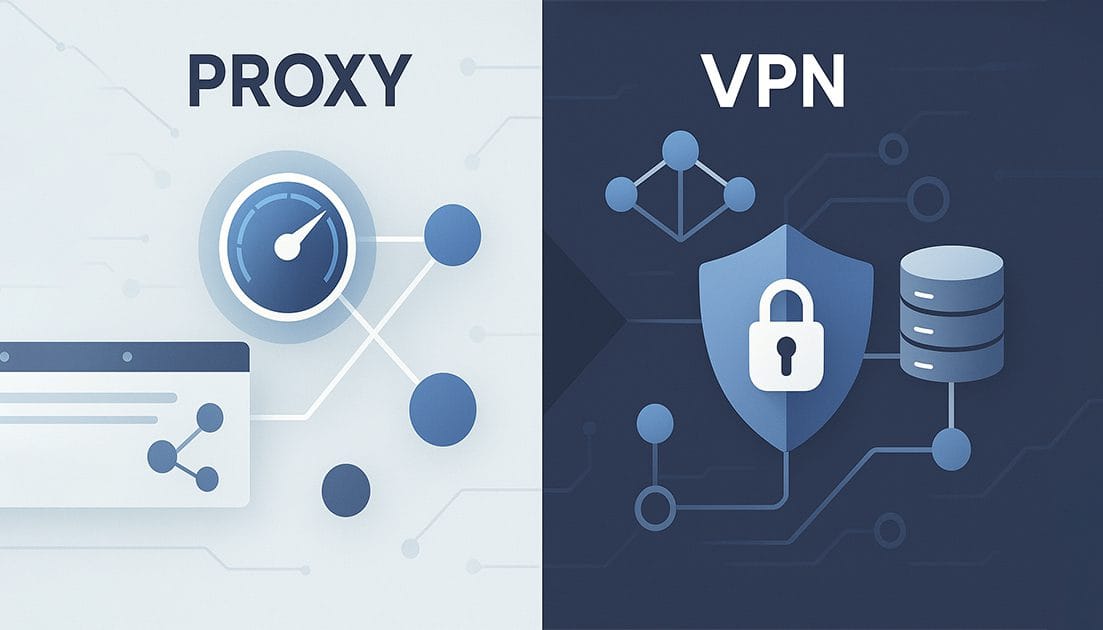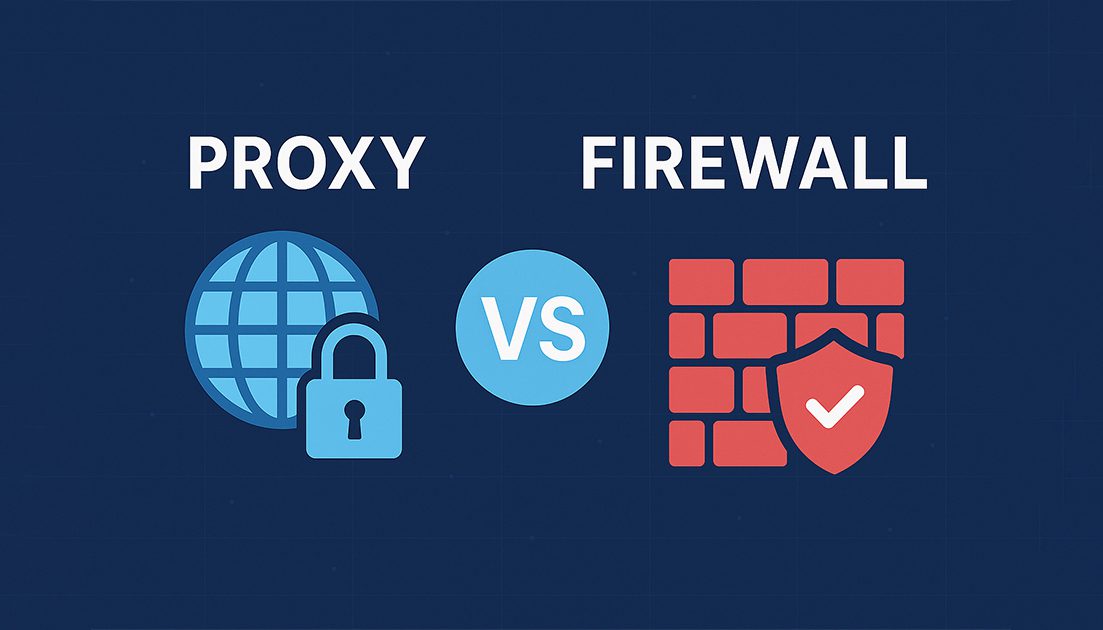If you’re trying to decide between a proxy or VPN, you’re not alone. These tools are often mentioned together and while they both help you bypass restrictions or stay hidden online, they serve very different purposes. Knowing when to use a proxy vs VPN can save you time, protect your data, and help you choose the right tool for the job.
In this guide, we’ll break down each tool’s strengths and the best situations to use them. Whether you’re scraping websites, streaming content or just trying to stay anonymous on public Wi-Fi, this article will help you decide.
Proxy vs VPN – A Quick Overview

Before diving into specific use cases, let’s compare the core differences between proxies and VPNs. While they can both change your IP address, how they work and what they protect are very different.
Below is a quick breakdown:
| Feature | Proxy | VPN |
|---|---|---|
| Traffic Encryption | ❌ No encryption | ✅ Full encryption |
| Device Coverage | Single app/browser only | Entire device |
| Speed | ⚡ Fast, low overhead | ⚠️ Slight slowdown from encryption |
| Best For | Scraping, automation, geo-access | Privacy, security, streaming |
| Privacy Protection | Limited or none | Strong encryption + IP masking |
While both tools help you access the internet through different IPs, the way they work and what they’re best used for, is very different. Here’s a quick summary to help you remember when each one makes sense.
🟧 Proxy Summary
- No encryption, app-level only
- Faster and easier to swap IPs
- Great for scraping, bots, and bypassing blocks
🟩 VPN Summary
- Full traffic encryption
- Device-wide protection and privacy
- Best for streaming, security, and censorship bypass
🟧 Use a Proxy When…
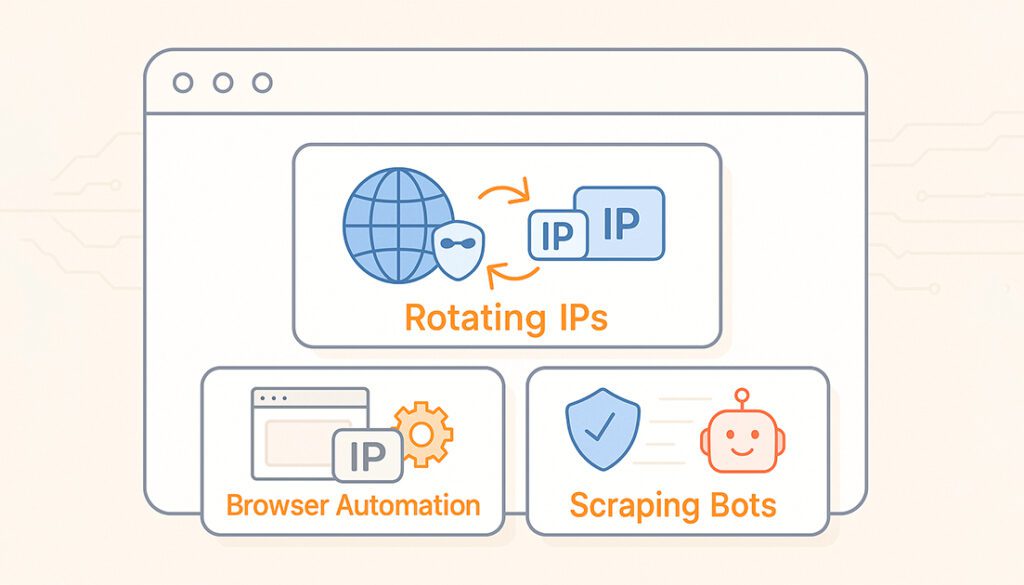
Proxies are lightweight, fast, and often more flexible than VPNs when it comes to specific tasks. They’re great when you don’t need full encryption but want quick IP changes, location spoofing, or automation support.
Below are common situations where a proxy is the better choice:
🕷️ Web Scraping & Crawling
- Bypass rate limits and captchas
- Rotate IPs to avoid blocks
- Speed-focused with minimal overhead
📲 Managing Multiple Accounts
- Maintain separate sessions per account
- Popular for social media automation
- Works well with browser-based tools
🌍 Bypassing Region Restrictions
- Switch IPs to access geo-blocked websites
- Faster than VPNs for quick access
- Great for sneaker sites and ticketing
🟩 Use a VPN When…

A VPN is the go-to solution when security and privacy are your top priorities. It encrypts all your internet traffic and routes it through a secure tunnel, protecting your data from hackers, trackers, and even your ISP.
Here are the situations where using a VPN makes more sense than a proxy:
🔐 Online Privacy & Security
- Encrypts all traffic across apps and browsers
- Masks IP address from ISPs and governments
- Essential for travelers and remote workers
📺 Streaming & Geo-Unblocking
- Access Netflix, Hulu, and more from abroad
- Stays stable across streaming sessions
- Works on routers, smart TVs, and consoles
🌐 Bypassing Censorship
- Access restricted sites in regions with heavy censorship
- Use stealth protocols to avoid detection
- Ideal for journalists, researchers, and students
Can You Use a Proxy and VPN Together?
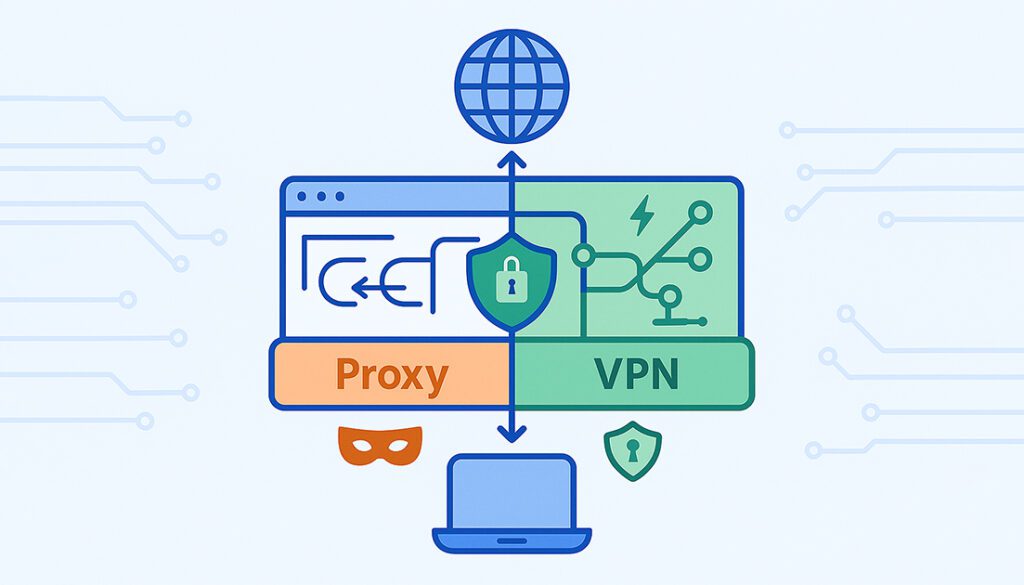
Yes — using a proxy and VPN together is possible, and in some cases, it can give you the best of both worlds. But it’s not always necessary, and it depends on your specific needs.
🤝 When Using Both Makes Sense
- 🛡️ Extra anonymity: You can mask your IP twice — once with the VPN and again with a proxy.
- 🔄 Custom routing: Use a VPN for encrypted traffic, and a proxy for specific app-level tasks.
- 👥 Advanced setups: Power users and enterprises sometimes stack them for layered protection.
🛑 When It’s Overkill
- ❌ You don’t need both if you’re just streaming or scraping casually.
- ❌ It can slow down your connection significantly.
- ❌ Configuration can get complex without much added benefit for most users.
⚙️ How to Set It Up
- ✅ Use a VPN app or system-level connection first.
- ✅ Then configure a proxy in your browser or tool (e.g., scraping bot).
- ⚠️ Always test performance and compatibility, not all services support stacking.
Real-World Scenarios Compared
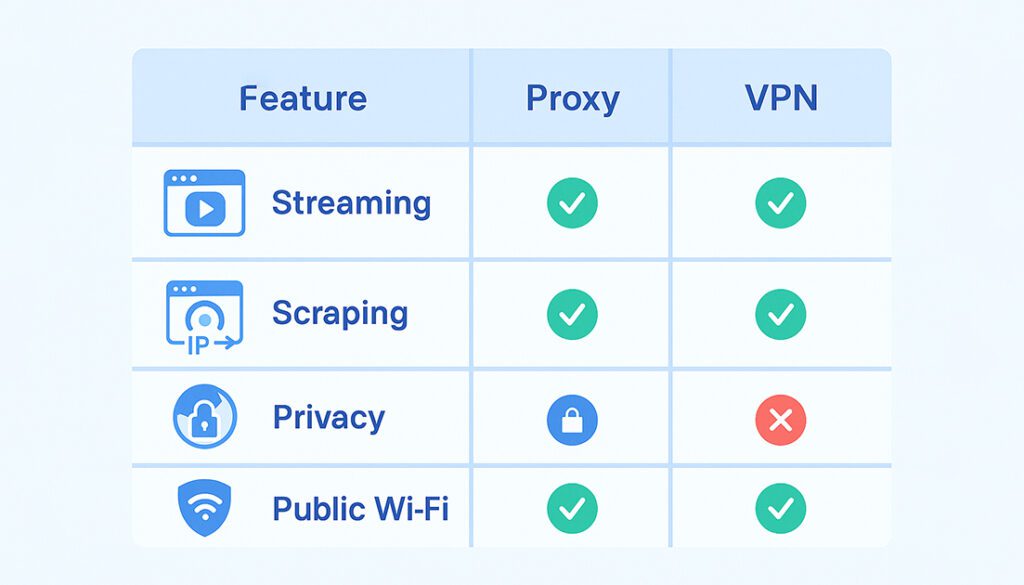
To make things even clearer, let’s break down how proxies and VPNs perform in common real-world situations. Whether you’re focused on speed, privacy, or functionality, this chart helps you choose the right tool.
| Scenario | Best Tool | Why |
|---|---|---|
| Streaming Geo-Blocked Content | VPN | Encrypts connection and bypasses content restrictions reliably |
| Web Scraping | Proxy | Faster, IP-rotated access, avoids rate-limiting |
| Public Wi-Fi Security | VPN | Encrypts traffic and prevents interception or snooping |
| Managing Multiple Social Accounts | Proxy | App-level control and unique IPs per session |
| Bypassing Government Censorship | VPN | Stealth protocols and encrypted tunneling bypass deep packet inspection |
Pros and Cons of Proxy and VPN
Still not sure which one is right for you? This breakdown of pros and cons highlights the strengths and trade-offs of each tool so you can choose with confidence.
✅ Pros
- Proxy:
- Fast and lightweight connection
- Great for scraping, automation, and regional access
- Customizable for specific apps or tools
- Multiple IP types (residential, datacenter, etc.)
- VPN:
- Encrypts all internet traffic for full privacy
- Ideal for streaming, security, and bypassing censorship
- Works system-wide across all devices and apps
- Stealth protocols available for restrictive networks
❌ Cons
- Proxy:
- No encryption, data is exposed to network snooping
- Can be blocked easily by firewalls or advanced detection
- Not suitable for secure tasks like banking or logins
- VPN:
- Slight speed reduction due to encryption
- Can be more expensive than proxy options
- May require advanced setup for compatibility with some tools
Frequently Asked Questions
What is the main difference between a proxy and a VPN?
A proxy hides your IP address at the app level, while a VPN encrypts all your internet traffic and provides system-wide protection. Proxies are faster and simpler, but VPNs offer stronger privacy and security.
Can I use a proxy and VPN at the same time?
Yes, you can use both together for layered protection. For example, run a VPN for encryption and apply a proxy inside a browser or bot for IP control. However, this setup may slow your connection and isn’t necessary for most users.
Are proxies or VPNs better for streaming?
VPNs are better for streaming services like Netflix and Hulu because they encrypt your connection and offer more stable IPs. Proxies may work for some sites, but they’re more likely to get blocked or fail mid-stream.
Is it safe to use a free proxy or VPN?
Free options often come with risks such as poor speeds, limited servers, or even data logging. If privacy and reliability matter, it’s better to invest in a reputable paid provider.
Do proxies encrypt your data?
No, proxies don’t encrypt traffic. They simply forward your requests and mask your IP. Anyone monitoring your network could still see what you’re doing unless encryption is applied separately.
Will a VPN slow down my internet?
Slightly. VPNs add encryption layers, which may reduce speed. However, modern VPN protocols like WireGuard are optimized for high performance and minimal slowdowns.
Which is better for scraping or automation?
Proxies. especially rotating residential proxies — are ideal for scraping. They let you rotate IPs frequently and avoid detection by anti-bot systems.
Can I use proxies or VPNs at school or work?
Yes, both tools can help bypass local restrictions. However, VPNs are often more effective in defeating network blocks, especially in places with strict firewall settings.
Final Verdict: Proxy or VPN – What Should You Choose?
Both proxies and VPNs offer ways to change your IP address and access restricted content, but they’re built for very different purposes.
If you’re focused on speed, IP flexibility, or lightweight automation tasks like scraping or managing multiple accounts, a proxy is your best tool. It’s fast, customizable, and great for task-specific control.
If you need encryption, full-device privacy, or you’re accessing sensitive content on public Wi-Fi, then a VPN is the safer choice. It secures your entire internet connection, protecting you from hackers, trackers, and censorship.
Ready to Choose Your Tool?
Whether you need speed for scraping or security for streaming, we’ve got trusted recommendations to help you decide.

